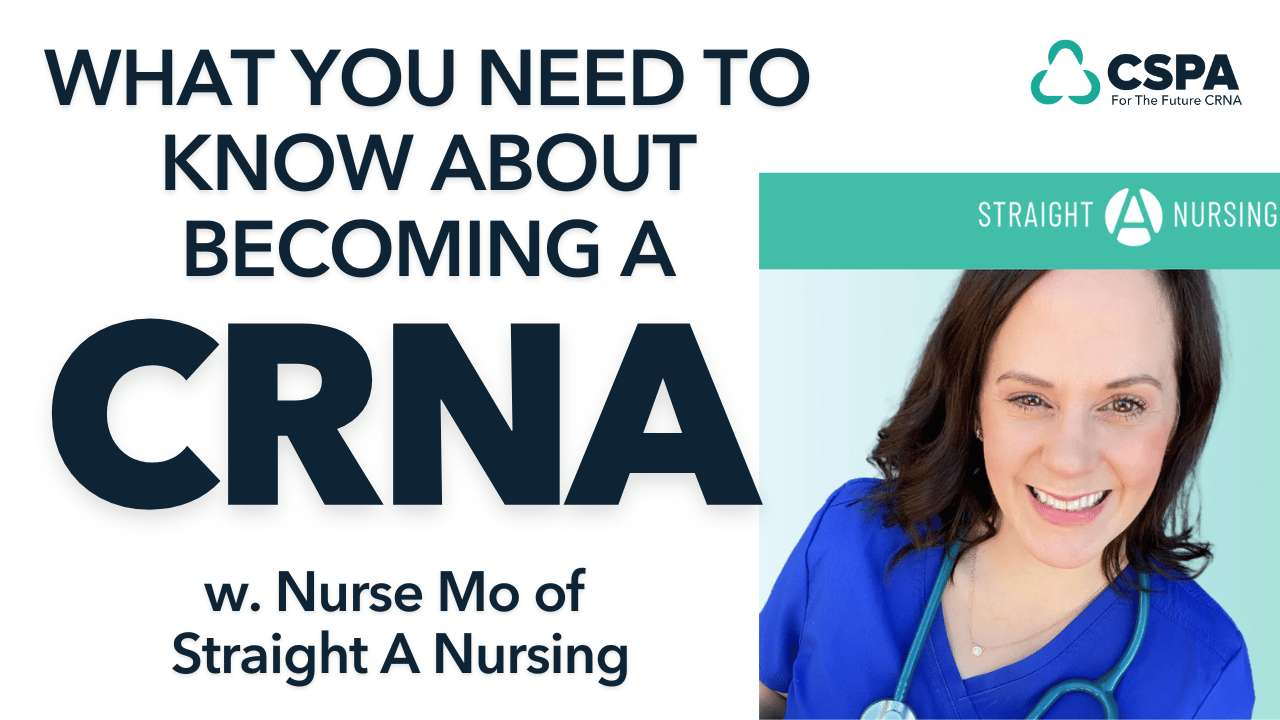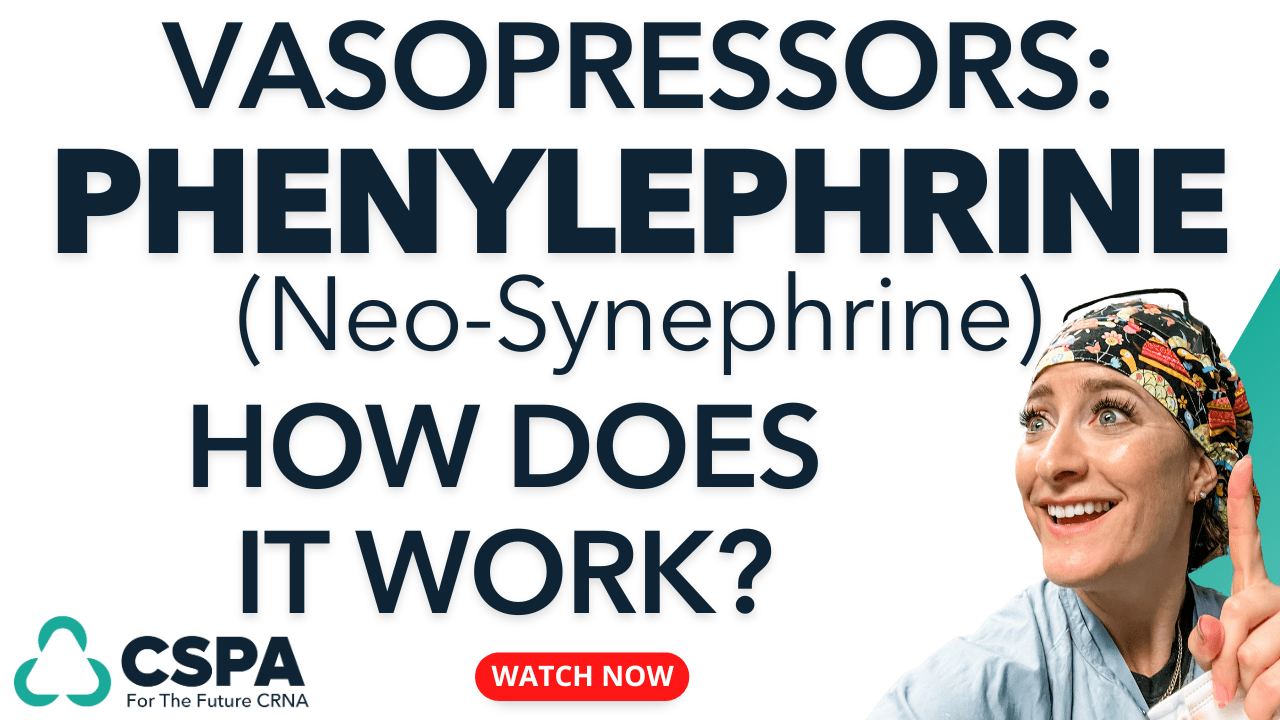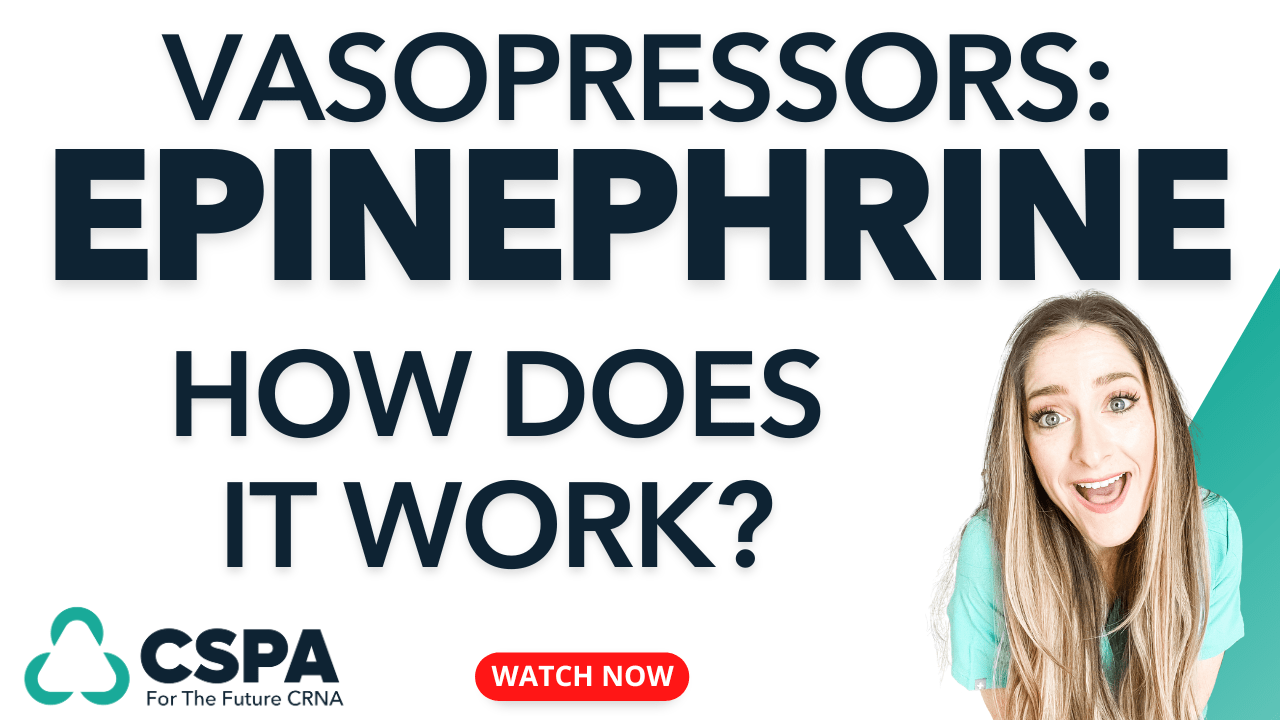
Get Your Free CRNA School Interview Prep Guide
Free CRNA School Interview Prep Guide Click Here
How competitive is a CRNA school in 2024, a world changed by the pandemic and currently dealing with unpredictable economic challenges? In this episode, Jenny Finnell talks about the current competitiveness of getting in such a school as far as the trends go. She also opens up about the mistakes she made during her own CRNA application and interview, as well as how she owned up to them.
Additional Resources:
FREE! 10 Clinical Questions and Answers – CRNA School Interview Prep Guide: https://www.cspaedu.com/interview-guide
Purchase the CRNA School Interview Clinical Questions Study Guide- 88 Questions Complete WITH ANSWERS!
https://app.teachrn.com/services/143
Thousands of nurses have gained CRNA school acceptance with CRNA School Prep Academy. Join today for access to all of the tools proven to accelerate your CRNA success! Click here:
https://crnaschoolprepacademy.com/join
Join the CSPA email list: https://www.cspaedu.com/podcast-email
Join the Free Facebook Community here! https://www.facebook.com/groups/crnaschoolprepacademyfree
Book a mock interview, resume or personal statement critique, transcript review and more: www.teachrn.com
—
Watch the episode here
Listen to the podcast here
How Competitive Is CRNA School In 2024?
In this episode, we are going to reveal how competitive it is to get into CRNA School in 2024. Within CRNA School Prep Academy, we have been mentoring for four years. We have mentored over 6,000 ICU nurses. Thousands of them have gone on to gain CRNA school acceptance. We have seen a trend. In this episode, I am going to share what we see as far as the trend, as far as how competitive it is, and some of the things around that make it competitive so you understand where you stand. Without further ado, let’s get into our episode.
—
Application Pool
First and foremost, as far as how competitive it is to get into CRNA schools in 2024, it is talking about the number of applications. The number of applications for CRNA schools has been on the rise. For example, there was a brand new program that was out West and they reported over 500 applicants for only 34 seats. That is incredibly competitive and mind you, this was a new program, so very few whereabouts as far as they did not have a lot of marketing under their belt yet or anything like that. You would think a more established program would get that number of applicants but this program is brand new. It had that many applicants for a brand new cohort. That is incredibly competitive.
If you look at an average ballpark, some schools only get maybe 80 to 100 applicants. other schools can get 500, 600, or 700 applicants. Where does the fine line lay as far as what is the average school? If you look at all the schools in the country, the average school in this day and age is right around 200 to 250 applicants. That’s the ballpark range for the average with the high end being 600 to 700, and the low end being closer to 100. When you are considering what CRNA school to apply to, knowing that is going to help you understand how much competition you are going to be up against. Unfortunately, you might not know what that application year is going to be like until it’s already over.
If you are applying to a school that has a history, knowing what the previous year’s application pool was like would be helpful because then you can look at it like, “This school gets 100 applicants.” Let’s say they take 50 students to make math easy. I have a 50% chance of getting in from the fact that they get 100 applicants and they take 50. That’s a 50/50 chance. Not that it actually exists. Do not get your hopes up. Usually, schools that get 100 applicants tend to be schools that take very small cohorts, like 8 to 10. That’s not always the case but it does seem to be the schools that get fewer applicants tend to also be the smaller schools.
Schools that get a lot of applicants tend to be schools that take a lot of students. One that comes to mind is Texas West. They have very large cohorts. They also get a lot of applicants to that program. Knowing the competitive nature of your program can give you an idea of what you are up against as far as the odds go. All apples were the same. However, keep in mind that when we state that the school has 250 applicants, sometimes schools are only reporting 150 applicants, maybe they got 200 applicants. Why is that different? That’s because they will discredit a good chunk of applicants they felt did not make the cut, thus not counting them as “true” applicants. They might have applicants who did not meet the minimum requirements; They do not even consider them a true applicant.
You will hear different numbers out there but know that schools, based on the overall application pool, how many applications they get versus how many they consider applications they need to review. Sometimes they report that number versus the overall number. You will say, “I heard the school got 250 applicants. How come you heard they only got 175?” It’s maybe because they got that many unqualified applicants. They did not even consider that in their qualified applicant pool. When they reported their numbers in an open house, it might have been lower than that because they only reported the qualified applicants. Meaning, ones they had to actually review.
Record numbers of applications, this has been a trend since the pandemic hit. Throughout time, applications have always gone up. If you look at the competitive overall nature of getting into CRNA schools, you are looking at about a 15% acceptance rate. Back when I even got into CRNA school, that was ten years ago when I graduated, so 12, 13 years ago when I was applying. It was a lifetime ago.
We are looking at the average being more like 20%-25%. We are shifting closer to 12% to 15%. I would still say we are sitting right around 15% but based on some statistics you look at, it’s closer to 12%. As far as the overall picture, the number of total applications and total seats. As far as how many applicants these schools are getting every given year- That statistic was taken from the NBCRNA. When they reported this, this was back in 2020 or 2021. It’s right around the pandemic.
I do not have the current numbers for 2023. They will probably share those relatively soon, but since things started to spike, I know it’s only going to get more competitive, which means if it was 15% back then, it’s probably closer to 12% now. You can look at it in two ways. You can say, “That feels depressing, Jenny. Thank you for the encouragement.” You could say, “You know what? I am going to try to be the best that I can be so I could be part of that 15%.”
That’s what it is all about. It’s understanding what you are bringing to the table so you can stand out amongst the sea of applications. Being a part of CRNA School Prep Academy is a great way to stand out because we essentially teach you all the little nuances that you need to do to make sure that your application shines. Get involved in different mentorship communities. It does not have to be CSPA but invest in yourself so you can make sure you know what to do to stand out. It is going to be worth your while.
It could be going to things like the AANA conferences, going to open houses, and making sure you are getting your essay peer-reviewed in some way, it does not have to be a paid peer review. It’s any peer reviews. Make sure you are giving that 7, 10, or 12 different edits before you submit it. I see a lot of people winging these applications and sometimes it works out in their favor if you are lucky and you are gifted, I guess. I would not be gifted if that was me.
It would look like a do-do. If I winged that application, it would look bad, but some people do and they are naturally able to do that. Good for them. Pat on their back. The majority of us need to put in the work. The majority of us need to fine-tune and critique our essay and our resume. Even if you think it looks great, get someone else to look at it because you have your own blinders. We all have our own blinders. We can not always see what we need to see ourselves. That’s why it requires our peers, colleagues, and friends to do it for us to say, “I noticed this.”You are like, “I had no idea.”
It’s because we all have blind spots within our own persona of what we think who we are and what we have achieved. Maybe we are as good as we think we are. We usually always inflate our ego and that’s human nature to say. “I’ve done this and this and I am fine.” In reality, when you are looking at everyone else in the pool, you are not as shiny as you think you are because everyone else is that shiny too. How can you outshine someone who is very shiny? Long story short, you have to know how to sell yourself and how to improve your weaknesses. People tend to want to steer toward the direction of comfort. Meaning, I will take this course because I know I can do well. That’s not the best idea.
You want to steer in the other direction and push yourself to the edge of uncomfortableness. This is where the most self-growth will occur and it will equally show that you are willing to do work that you know is going to be difficult and hard, and you are still going to be successful. If you have not seen Chemistry in your undergrad degree, take a Chemistry course. Do not take a Microbiology course. “I got an A in Microbiology. I might as well take another one and I know I will get another A.” No, you want to show that you made the decision to take a course you once struggled in and now you are able to get that A.
Push yourself to the edge of being uncomfortable. This is where the most self-growth occurs. Click To TweetThat’s my advice for you. Steer yourself in the direction that makes you uncomfortable. That is usually where you need to go. There is a reason why it is uncomfortable. There is a reason why you do not want to do it because you are facing yourself in the mirror and you are like, “Darn it, Jenny. I guess I have to do this. I do not want to take another course or I do not want to take the GRE, but I guess I am going to.” That is the path of uncomfortableness. I feel like I do not want to do it but I know I need to do it. Listen to that little tiny voice in your head.
If you are questioning whether you should do something, that probably means you should be doing it. First and foremost, before you go out and take additional courses and take the GRE and all other stuff, make sure you are investing time and energy. You need to know your program, getting to know what you are up against as far as the competitive nature of your program. If they are able to give you feedback on your transcripts or if they are able to give you some advice, make sure you are asking for it. You will never know unless you ask. The worst response you can possibly get is either crickets or “I do not have time for that.” “Okay, I will go somewhere else and find someone else who has time for it or I will figure out other resources.”
That is the worst-case scenario. It blows my mind that people are so afraid to ask because they do not want to hear that response. They do not want to be ghosted. They do not want to hear no, so they do not ask. You are missing a huge opportunity. You need to ask. If you do not ask, you will never get, so you can ask. It is okay. Do it politely and respectfully. Do not give them an entire paragraph to read. Be direct to the point, “I took this class. I got a C in undergrad. Is it going to be worth retaking? Here are the courses I have looked into retaking. Would you recommend any of these?”
Do the work. Do not make them do the work for you. Do your own research and what you think you need to retake, what you could retake, where, and then have them pick. That way, it is easy like yes or no or that and bye. Do not give them an open-ended question which they have to then respond in a paragraph format. That is a lot more likely to be denied. Make it easy to answer. The easier you make your question to answer, the more likely you are going to get a response. Keep that in mind when you reach out to a program. Be respectful, polite, and professional.
I have shared this story before but I am going to share it again. It’s been a while. Funny story. When I was preparing to apply to CRNA school, young little Jenny here, I was also in wedding planning mode, sending out massive amounts of emails every day to wedding planners and vendors and all kinds of stuff. That’s an excuse. That’s my mental excuse. Long story short, I was in the midst of doing all that and also equally looking at what I needed to apply to CRNA school. I was not sure where I was competitive-wise.
I do not know. I feel like I have done all the right things, but I do not know. Maybe I could do more. I reached out to the program director to see if there’s anything else I can do to improve my odds of being accepted. It’s like what I teach you guys to do too. I did these things back in the day. However, for whatever reason, I laugh now because I could not believe I did that. Here is what I did. The program director of the time was Mr. Barton, and he is no longer at the school anymore.
His first name was Charles. I said, “Hey, Charles. Can you give me advice?” I still cringe like, “What was I thinking?” My gosh. He was not a doctor-prepared CRNA. He went by Mr. Barton, but I did not call him Mr. Barton. I said, ‘Hey, Charles,” flat out like completely disrespectful, rude, whatever you want to call it. He rebutted that email and said, “How dare you address me so informally?” I forget if he called me a Millennial, Generation Z, or Y. I do not remember but he ultimately had me do a research paper on how disrespectful our generation was.
If that gives you any hope, and I got accepted into the school by the way. I think it was a four-page paper I wrote. After I did it and sent it to him, he was very thankful and told me I did a good job. I was like, to my future husband, “Let’s get married and change my name.” Which I did. I went and got married, changed my name, and went and applied and hoped that they did not remember who the heck I was. I was a new person with a different last name. Honestly, at the time, I was so embarrassed about that happening. I never did bring it back up.
It was a lot like bygones be bygones. I got into that school. I remember being crushed when I got that response thinking I had totally hosed any chance of me getting into this school. I am now blacklisted and it goes to show that it is not always the case. Do not lose hope if you make a little screw-up. Own your mistake, make up for it, and move forward.
GPA For CRNA School
Next on our list is how competitive are CRNA schools in 2024: GPA. A couple of years ago, I would say the GPA average was 3.5. It is getting higher than that now. It is more like 3.7 and I know you probably have a gut feeling in your stomach. Do not go out there and take all these courses. If you are a 3.5 or 3.4 even, do not go out there and take these courses. I am not saying that and that is not my intention of telling you this, but GPA is on the rise.
Why? It’s because they are getting more applications. They are getting more and more qualified applicants who meet a very high GPA background. What this essentially means to you is you cannot sit still. You have to be willing to take some additional courses if your GPA is on the lower side, but not your overall GPA. What is your Science GPA? That is what really matters, your core sciences. They are not going to want to see an F in Art History. An F in Art History is not going to mean the same as an F and Microbiology or an F and Pharmacology.

CRNA School: You must be willing to take some additional courses if your GPA is on the lower side.
If you have an F, D, or C in a major core science, that is a huge red flag because they want you to be successful. They do not want you to flunk out. They do not want to rack up their attrition rate because they let people in the program who cannot be successful based on their track record. “They have a track record of achieving Bs, Fs, and Ds. How in the world will they ever maintain a B-plus and A-average in these high-level science courses?” It’s not realistic.
They have to be realistic with whom they give an opportunity to interview and also gain acceptance. I am not saying that just because you have that track record means you’re hosed or that you are not capable. I truly believe that if you want something bad enough, you can do whatever you want. I know that 10 or 15 years ago, you were a different person. We all were. You are that girl who said, “Hey, Charles.”
We all have maturing to do through our lives. We all make mistakes. It’s okay, but you have to be willing to go the extra mile and prove to them that you are now different. That you do have better study skills now. That you are now able to put in the effort it takes and is required to get an A. Be sure you can show that on paper. You have to provide proof. You can not say, “I promise.” The proof is in the pudding. You have to make the pudding. You have to show them that you are capable by actually doing the work and showing them on paper that you can achieve it.
GPA is on the rise as far as the average goes. As I said, this was a couple of years ago now, but when I talked to my old Alma Mater, they said they did not even have to look at applications less than a 3.4. They said that they had so many applications. This was back in 2021. They did not even have to look at anything less than a 3.4. That is alarming, but this is also a school that historically loves high GPAs, meaning they put a ton of weight on a GPA.
I am not saying some schools do not put any weight on GPA or do not think it’s important because they all think it’s important. However, there are other programs that if you look at the overall average GPA, you will notice it’s not as high. That’s usually because they tend to not put as heavy emphasis on that as maybe say emotional intelligence or the personality they gave in the interview, what they have achieved as far as ICU experience, their knowledge base, etc.
They are willing to let a lower GPA come to the program, knowing that there are more holistic pictures. There are better applicants overall because they are not just all brains. They have some interpersonal skills too. Sometimes book people are not exactly the person kind of people. To be a CRNA, you have to be a people person. I know you put people to sleep, but you still interact with anesthesiologists, your surgeon, your scrub techs, and your patients when you are interviewing them in the prep area.
Even though people make jokes like, “I like people under general anesthesia,” we still have to have people skills, including being a part of a cohort. You are a teammate when you are a cohort. You are part of your class. You do not want to be that person in class who makes everyone’s life miserable. They will not want to pick you no matter how smart you are, bookwise. Keep that in mind. It is not always the GPA. You can have a 4.0 and get rejected from CRNA school. I have seen it happen. I have never forgotten. She reached out to me. She was like, “I do not get it, Jenny. My co-worker who has a lower GPA, did not have as high a GRE score, and had less ICU experience got in and I did not. I do not understand why.”
When they investigated, it turned out that the interview panel felt that they were cocky. They felt like they were arrogant during their interview. She was like, “Really? How could they ever think that about me?” She was shocked but it shows that she lacked that perspective of her tone and how she came across. There’s nothing wrong with that. You might say, “That’s unfair.” Humans are not perfect. We are not robots yet. We might be in the future but right now, we are still very much so people and we are very imperfect.
People judge a book in the first five seconds. They look at you in the first five seconds and make a decision on who they think you are. Are you friendly? Are you not friendly? Are you arrogant? Are you not arrogant? Done. The rest of the tone is set and that’s unfortunate. Maybe it was nerves. Maybe the nerves got the best of her and so she was stone cold and was not smiling. I do not know. I was not there, but it was a misconception.
She went back to the interview and did great and got in. She was baffled, and it goes to show that this is not the only occurrence. There are plenty of students who have a high GPA that get turned away and the lower GPA gets the chance to get in instead. Do not be deterred if you have a lower GPA but also be willing to do the work to show that you can do the work.
ICU Experience For CRNA School
ICU experience. How is this changing in the competitive realm of getting into CRNA school in 2024? A lot of people have now traveled or do have travel experience. While I think that this is fine, it became almost the standard back during the pandemic and it is becoming what they originally thought, which is not the preference because you typically do not get the best of the sickest of the sickest patients. This is the barrier that most programs face when they think of travel experience.
You have to make sure that if you are traveling, you can highlight your high acuity experience. Other things too are people have gotten like, “I am burnt out. I can’t do it anymore. I have to leave.” They go to places like the PACU, the OR, or another unit, the cath lab. They think because they have ICU experience in the past, they are going to be fine going into CRNA schools. That is not always the case.
The most competitive applicants are currently in the ICU at the time that they apply and interview. On top of that, some schools make you sign a contract saying you are going to remain full-time in the ICU until you start the program. Not that you have to work up until the day before you start your anesthesia program. You can take a month off. If you can financially, do it. Two months off, do it. For the most part, they do not want you to get into school and then leave, especially if your ICU experiences are on the borderline of the requirement. Meaning that you’re just meeting the minimum, or not even there yet. If you are barely meeting that requirement, by the time you start school, they are going to expect you to stay to fully meet that requirement.
You do not want to risk that because if you leave and they find out and you went against that, you will be out so fast and you blew that opportunity. You do not want that to happen. I had one of our students who applied to a CRNA school. He got an interview. He was shocked. He’s like, “No way I got into an interview. This is amazing.” This was all back around the pandemic time. He was burnt out. He was like, “I am tired in the ICU. I got an interview. I am going to go.”
I think he went to the cath lab. During the interview, they asked him about his current ICU status. Essentially, he was like, “I am in the cath lab.” They were like, “Why did you do that?” Long story short, they liked him. They wanted to accept him, but it was contingent on him being able to get back into his original unit, it was a surgical ICU, within two weeks or his application would be voided and they would pick the next applicant.
He had two weeks. If he had completely left the SICU, he would have been in big trouble. The reason he was able to go back and become full-time is because he kept it a contingent position. He still moonlighted there on occasion. He was able to go back and get his full-time position to prove that he was full-time in the SICU. He was able to keep his seat. Had he completely cut ties and left, what if there was not a job opening? Obviously, during the pandemic, there are probably twenty job openings for the SICU at that time or at least in the MICU.
There would have been plenty of Respiratory ICUs from the joint. All that being said, it was a big eye-opening moment to just be careful. I am not saying you can not leave the ICU, but make sure you understand what the requirements are of your program and make sure that they are aware that you want to leave the ICU and seek their counsel if that’s okay for you to do. You can be honest that maybe you need a mental break that you know before starting CRNA school what you need the most is get a break in the ICU. If you already have that 2 to 3-year experience, maybe it’s not going to be as big of a deal for you to leave the ICU once you gain acceptance. It would be if you had barely got your mark.
Understand that these are great questions to ask during an open house. For example say, “Do you look poorly upon a candidate not currently being in the ICU, and/or do you allow an applicant who has gained acceptance to then transfer out of the ICU while they wait to start the program so they can get a little bit of a breather?” Ask these questions and see what they have to say. You will hear different answers from every program, I can guarantee you that. They all have a little bit different opinion on that. I would make sure you are asking your programs about how they feel. That is my wording on the ICU experience. Make sure that you are currently in the ICU. This is always going to be the best possible scenario. If you are unsure, remain current.
I also have another story. I interviewed a previous CSPA student. She said that she was accepted on the spot, but her colleague was rejected essentially on the spot. Ultimately, the whole interview was going well and then they brought up a sore spot on her application which is why are you the only applicant we are interviewing who is not currently in the ICU? Why should we let you in?” They had no rebuttal for that. They were speechless. They did not know what to say and let us say it went downhill from there. They did not get into school. That stinks. That was the one pitfall in their application. Do not let that be you. Be current in the ICU if you can and you can tolerate it, just enough to get experience, and then ask if you can transfer units at that time if they are okay with that.
Leadership Roles For CRNA School
Leadership. Everyone can have some type of leadership, but here’s the difference between leadership roles that is meaningful. What did you actually do? What are you doing? Because to join a committee to check a box but never go to the meetings, never do anything, but I am a part of the committee. It’s going to be very apparent when they ask you about it. You have nothing to say versus an applicant who is part of a committee but has led a research project or is actively taking surveys on their unit and trying to make positive changes for whatever it may be.
Make sure that you are joining the committee, or any leadership “program” that you are actually doing something. You are not just joining it for a resume checkbox booster. Make sure you have something meaningful to contribute to that leadership role. There will be things like precepting and charge. Those are both leadership roles. What is it about being a preceptor that makes you more equipped to become a CRNA?
That might be a question. Same with being a Charge Nurse. What is about being a Charge Nurse that makes you more equipped and more able to be successful in CRNA school? Think about those things because if you have those leadership roles, you should always be thinking about how it’s going to help you. They are going to be wondering what you think and your answer could be very insightful for them as far as what are you getting out of that experience that is going to help you.
CRNA School Interview
Lastly, as far as how competitive CRNA schools are in 2024. I already spoke about how many applicants they get and cover some of the big hitters like GPA, ICU experience, and leadership roles. Lastly, it is your CRNA school interview. You can do everything right. Perfect. You have crossed all your T’s and dot all your I’s. You are like, “My application is gold. I am going to throw this in their desk and they are going to be like, “Come here.” You could get into your interview and that balloon could pop in your face like I spoke to before.
I have heard so many crazy stories. Sometimes it’s what hat you wear or something as silly as your outfit. Maybe you pull out a giant Prada bag that is half your face and you have to look over your bling-bling jewelry. They are like, “Whoa, that is quite a statement piece.” Be professional. It is not a time to be wearing the latest trends. Wear a normal blazer or high-cut shirt, ladies. Men, make sure your hair is brushed, and that you have shaved. Things like that go a long way to make sure you look like you are there. Not like you rolled out of bed, you did not tuck in your shirt or whatever it may be.
Make sure you put in the effort to show that you are there. Do not wear jeans. Wear a suit. Do not even wear khakis. Wear a suit. This is the time to get a suit. You will need that suit when you interview for a job in the future anyway. Buy a suit. This is the time to wear it. Stuff like that and making sure you are practicing self-awareness.

CRNA School: During a CRNA interview, make sure to put in the effort to show that you are there. Do not wear jeans or even khakis. Wear a suit.
If you are someone like me who uses her hands when she talks; Not to mention, I also can talk fast, especially when I am nervous. Sometimes that can play in my favor because I can let it all out there and I am very easy and can go with the flow of conversation. Other times, I can bite off more than I should and I say more than I should. You have to be aware of that. Have some quiet space before you keep digging yourself a hole.
I did dig myself a hole in an interview. My very first interview went pretty poorly. It was a learning experience. I could not come out of that. I learned from that and went on the next time, knowing that I need to be more careful and be more thoughtful too about what I would say in certain situations and what I would not say. It’s okay to use your hands and stuff, but if you are flying in their face, it could come off as you are over dramatic or, “I do not know if we could handle her. She’s intense.”
It’s equally okay because it shows you are engaged. It shows that you are being thoughtful. Also, when you use your hands to speak, it creates more energy and also creates more eye contact and relatability to the person who is answering the question. Be careful because it is equally okay to take your busy hands, throw them in someone’s face, and be all animated. Put them down and fold them. If you have to throw your thumbs, throw your thumbs.
Sometimes it’s nice before you get too crazy and animated to take your hands and cross them. That is what I would do if I was in an interview. I am using my hands now because I am on a casual podcast. It is my podcast. I can do what I want. I can throw my hands in your face all the time if I want to. If I was in a professional interview, I would take my hands and I would fold them because I know if I did not, I would use them.
On occasion, I might unfold them and use my one hand to create some movement in my voice and my tone but I would then re-cross my hands after I explained the answer to make sure I am not getting too in their face with my hands. This is all about awareness and practicing your interview is key. Practice, practice, practice. Brush your clinical base knowledge and your EI situational awareness questions.
You may think, “My school is not going to ask me a single interview or clinical-style question because I’ve heard historically they do not.” That is great that you know that they historically do not ask clinical questions, but you never know. These schools know these students talk. They all know. I know the majority of interview panels will switch up the interview in the middle of the interview season because they know candidates talk to other candidates. They do not want all of their questions being spewed to every other candidate coming in and having them have an unfair advantage.
They know all the questions we are going to ask. They typically have a very large bank and anything is fair game. They do tend to have favorites. I will say that they do tend to have favorite questions. They do tend to mix it up at the same time to make sure that not one person is coming with an unfair advantage to know all the questions and that they have been able to prepare the night before. Be prepared for anything and then on top of that, I also know when program directors change, or any faculty member or the admission panel.
They bring in different people sometimes every year for these admission panels. They have different questions. You might have been tipped off from the year before where your friend got in. Maybe when you go in, they do not ask you anything the same. You are like, “I was not ready for that.” You shouldn’t expect to be. The whole point of practicing interview questions is not to know the exact question you are going to be asked but to practice the intention behind it. Brush up on your Critical Care knowledge, know your ACLS, practice your EI questions and situational awareness questions, and practice the STAR method.
Practicing interview questions is not about knowing the exact questions you will be asked. It is about practicing the intention behind it. Click To TweetWhat is STAR? Situation, Task, Action and Result. If you practice telling a story with the STAR method, you tend to be able to create a whole picture versus when you are nervous, you might only tell a few bits and pieces of the story. In your mind, it makes sense because you were there. The story has a finish, a start, and a result. If you are not clear on telling that story, the person who has never been involved in a situation is going to be like, “It does not make any sense. You have a bunch of holes. I have no idea.” Practicing telling a story even is important.
Do not wait until you are asked in the interview. Practice. If you plan on applying to CRNA school, you should begin practicing your interview skills. You should not wait. It should be mixed in between working on your essay and resume. You should also equally be preparing for your interview that early. I am pretty sure I prepared for six months and I still failed. I then practiced for a few more months and I interviewed again, and then I was successful. All in all, it’s nine months of practicing and preparing for my interview. That was before the day of having options like TeachRN.com where you can go buy a mock interview.
I was practicing in the mirror. I was doing it in front of my husband. I do not think my phone even recorded back then so I could not record myself. You could come on Zoom. Get a free Zoom account and record yourself asking yourself questions and then check to see how much eye contact you are making, especially if you are going to be doing a virtual interview. I also want to preface this with if you have the option to go in person, please go in person. You do not want a virtual interview if you do not have to have one. If there’s a situation that does not make it possible for you to go in person, it’s okay.
You will always do better in person and it is more personable. They are going to be able to connect with you better in person than they could online. It is not fair to you as a virtual applicant to do one on the screen, in my opinion, and then have other in-person interviews. I personally think a human, you are going to make deeper and better connections in person with someone than you would on a Zoom call. You are doing yourself a disservice by even being on Zoom anymore. If you have the option, I would always pick to go in person.
Last, I want to make sure you know what the freebie is. It is the 10 clinical-style questions with answers. You can grab that freebie. There is also going to be a link to a paid resource. It is 88 clinical-style questions with rationale/answers. You can purchase it for $27.99 if you want to purchase that full guide. Otherwise, enjoy the freebie. It’s 10 questions that I feel will help you get a good start on preparing for your interviews. Best of luck and cheers. Until next time, bye-bye.
Important Links
FREE! 10 Clinical Questions and Answers – CRNA School Interview Prep Guide: https://www.cspaedu.com/interview-guide
Purchase the CRNA School Interview Clinical Questions Study Guide- 88 Questions Complete WITH ANSWERS!
https://app.teachrn.com/services/143
Thousands of nurses have gained CRNA school acceptance with CRNA School Prep Academy. Join today for access to all of the tools proven to accelerate your CRNA success! Click here:
https://crnaschoolprepacademy.com/join
Join the CSPA email list: https://www.cspaedu.com/podcast-email
Join the Free Facebook Community here! https://www.facebook.com/groups/crnaschoolprepacademyfree
Book a mock interview, resume or personal statement critique, transcript review and more: www.teachrn.com








